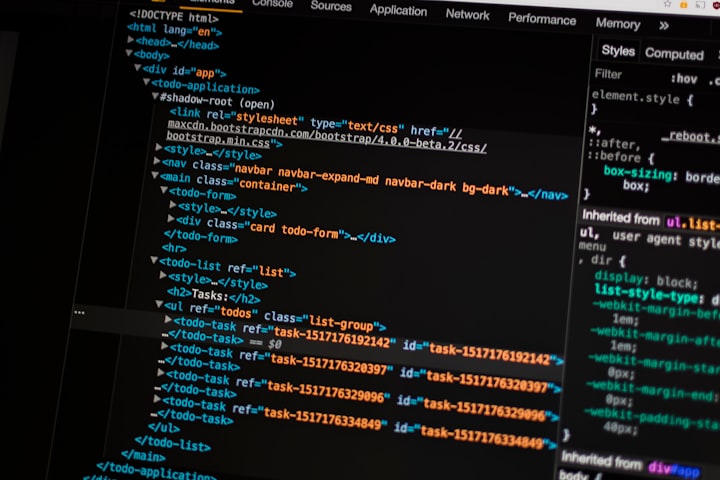Difference between Front-end and Back-end Web Development

Programming is a broad field with many different topics and skills. It can be difficult to choose a specific area to study without knowing what roles and tasks are involved.
Web development is the process of creating a website. This includes the more technical aspects of building a website, such as programming, markup, and scripting languages to create features and functionality.
Two common career paths in programming are front-end web development and back-end web development, or full-stack web development.
Different types of web development
Front-end web developers are responsible for the design and functionality of the website that users see and interact with. They use a variety of programming languages to create the user interface and website layout.
Back-end web developers create the behind-the-scenes functionality of the website. They use server-side programming languages to connect the front end to the back end databases and systems. Full stack web developers have a comprehensive understanding of both front-end and back-end development.
Full-stack web dev is combining front-end and backend web development into one role. This means that a full-stack web developer needs to be proficient in both front-end technologies (like HTML, CSS, and JavaScript) and back-end technologies (like PHP, Ruby on Rails, and Node.js).
If you're interested in a career in web development, you may be wondering if you should pursue front-end or back-end development. Both front-end and back-end developers have excellent career prospects, including high salaries and long job growth, according to the software engineer salary report 2022. However, there are some differences between the two fields.
In this guide, we'll help you understand the more intricate details of both back-end and front-end development so you can decide which area is right for you.
Front-end web development
Front-end developers are responsible for the overall design and aesthetic of a website, as well as coding and creating front-end elements that are directly viewable and accessible by the end-user or client. They work to enhance the user experience and ensure it is seamless.
In front-end web development, designers and developers work together to create a cohesive website experience. Designers focus on the overall look and feel of the site, while developers focus on coding the front-end elements.
Front-end web developer skills
Front-end developers use a variety of programming languages and tools to create websites and web applications. They must have a strong understanding of user experience and be able to translate that into code. The most important skills for a front-end developer are:
- HTML: Used to structure content on a web page
- CSS: Used to style content on a web page
- JavaScript: Used to add interactivity to a web page
- jQuery / ReactJS / VueJS: JavaScript libraries that make working with JavaScript easier
- AJAX: Used to load content on a web page without refreshing the page
Some other essential skills for front-end developers include:
- A strong understanding of HTML, CSS, and JavaScript
- The ability to code responsive designs that work across multiple devices
- The ability to create interactive elements using JavaScript
- A good eye for design and attention to detail
- The ability to work well with others in a collaborative environment
Front-end web dev jobs
There are a few different types of front-end development jobs, each with its own focus and responsibilities. Front-end developers may specialize in web design, user experience (UX) design, or web programming. They may also work as part of a team, focusing on one specific aspect of front-end development.
The title of "front-end developer" can mean different things to different companies. However, some common skills associated with front-end development jobs include coding languages like HTML and CSS, as well as graphic design and content creation.
Here are some common job titles for front-end web development jobs:
- Front-end Developer
- Front-end Web Developer
- Front-end Engineer
- HTML/CSS Developer
- Front-end Web Designer
- Full-stack Developer
- UI Developer
Front-end web dev salaries
There is no one-size-fits-all answer to this question, as salaries for front-end developers can vary widely depending on a number of factors, including location, experience, and skillset. However, according to Glassdoor, the average base salary for a front-end developer in the United States is $95,000 per year.
Salaries for front-end developers can also vary depending on the specific industry they work in. For example, front-end developers who work in the financial industry may earn higher salaries than those who work in the retail industry.
Finally, it's worth noting that salaries for front-end developers can also vary depending on the company they work for. For example, front-end developers who work for Google or Facebook may earn significantly more than those who work for smaller companies.
Back-end web development
Back-end developers are responsible for the server-side of web development. They work to create and maintain the databases and applications that power the front-end of websites.
In back-end web development, developers work to create the functionality and logic that powers the website. This can include anything from creating database queries to managing user authentication.
Back-end web developer skills
To be a successful back-end developer, you will need to have strong problem-solving skills and be able to think abstractly. You should also be comfortable working with various programming languages, as well as databases and server-side technologies.
Some skills that are important for back-end developers include:
- Strong programming skills
- Experience with server-side languages (such as PHP, Ruby on Rails, Java, .NET, Python and Node.js)
- Experience with databases (such as MySQL, MongoDB, or Cassandra)
- Ability to create and maintain APIs
- Familiarity with front-end technologies (such as HTML, CSS, and JavaScript)
Back-end web dev jobs
If you're interested in a career in back-end web development, then you should consider studying one of the aforementioned programming languages. Alternatively, you could complete a computer science degree, which will give you a solid foundation in all aspects of web development.
Some common job titles for back-end developers include:
- Back-end developer
- Back-end web developer
- Ruby on Rails developer
- PHP developer
- Java developer
- .NET developer
- Python developer
- Node.js developer
Back-end web dev salaries
Back-end web development salaries vary depending on a number of factors, including experience, location, and company size.
In general, entry-level back-end developers can expect to earn around $50,000 per year. Mid-level back-end developers can expect to earn around $75,000 per year. Senior-level back-end developers can expect to earn around $100,000 per year.
Back-end developers with more experience can expect to earn higher salaries. Developers with experience working in larger companies can also expect to earn higher salaries.
Choosing between front-end and back-end web development
Skilled front-end and back-end developers are in high demand and can command high salaries at startups, large organizations, and nonprofits.
Those with experience and a strong portfolio will have the best chance of landing these positions.
There are questions you can ask yourself to see if you prefer front-end or back-end.
- Do you like working with code that is visible to users, or do you prefer working on code that powers the site but is not seen by users?
- Do you like working with design elements, or do you prefer working with databases and code?
If you prefer working with design elements and code that is visible to users, you may be better suited for front-end development.
- Do you enjoy turning mockup design into a real website?
- Do you enjoy making great user interfaces and experiences?
- Do you enjoy making websites responsive and work for all screen sizes?
- Do you enjoy optimizing websites for speed and performance?
If you prefer working with databases and code that powers the site, you may be better suited for back-end development.
- Do you enjoy working with databases and code that powers the site?
- Do you enjoy working with the server and hosting environment?
- Do you enjoy optimizing the server and database for speed and performance?
- Do you enjoy connecting different parts of a website together?
Full stack web development
Full stack developers are responsible for both the front-end and back-end of web development. They have a deep understanding of both sides of web development and can work to create a cohesive website experience.
In full-stack web development, designers and developers work together to create a cohesive website experience. Designers focus on the overall look and feel of the site, while developers focus on coding the front-end elements.
Altcademy
Altcademy is a great way to front-end, back-end, and full-stack web development.
- Affordable, 100% online
- Self-paced, learn on your schedule
- Beginner-friendly, and designed by expert coders
Get Full-stack Web Development Syllabus (2022) for free.




